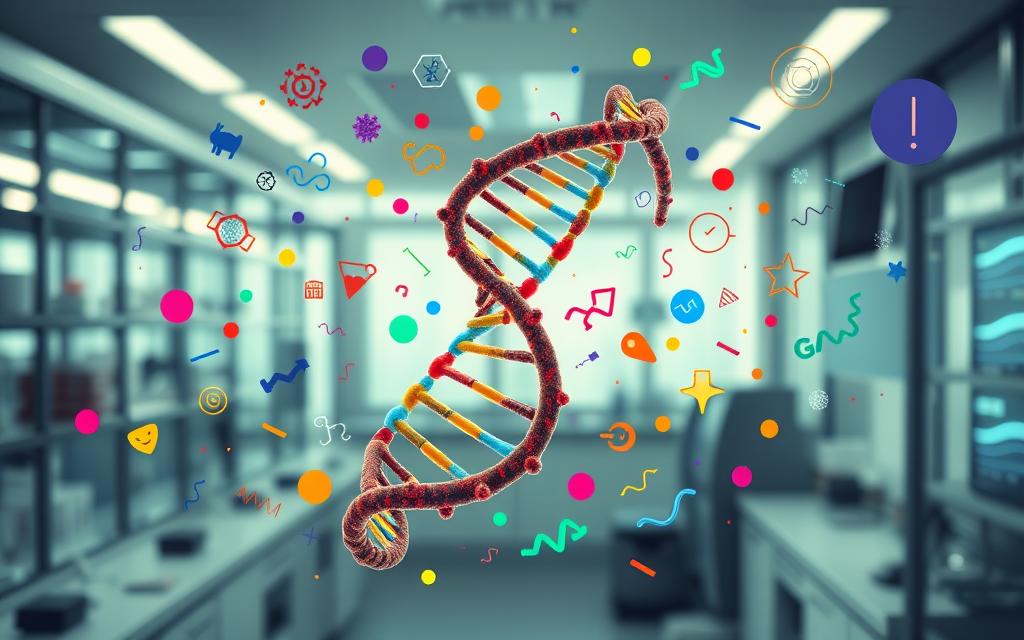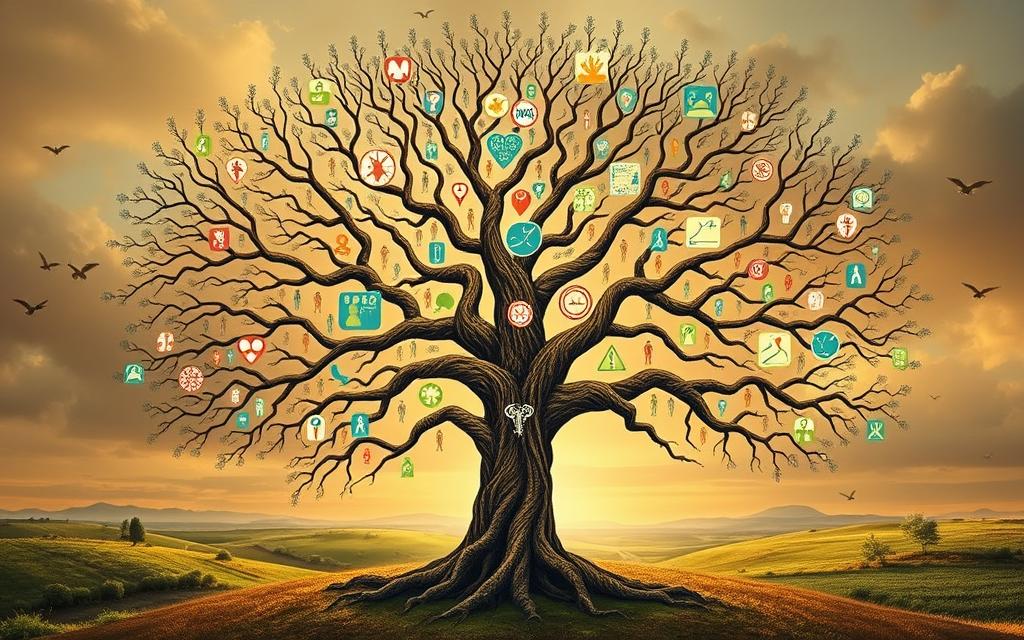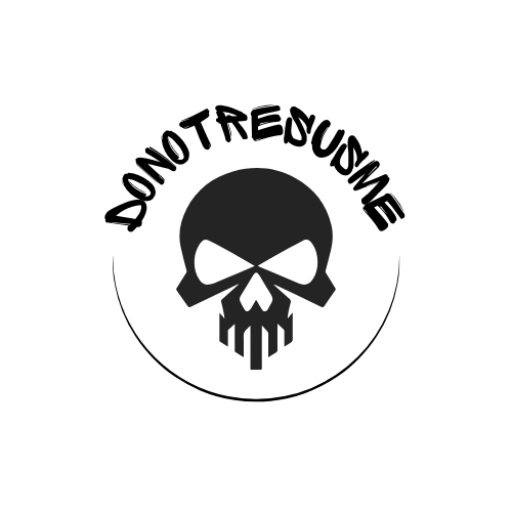Did you know our genes can shape up to 50% of our personality? Our DNA holds the key to who we are, from our traits to our looks. Through personal genomics, I’m exploring how my genes have shaped me.
I love learning about my genetic ancestry and what a DNA test can show. Discovering my health risks or my mixed ethnic background is fascinating. It’s like looking into my own identity.
But there’s more to our genes. Epigenetics shows how our choices and environment change our genes. This mix of nature and nurture makes our story even more interesting. It’s made me want to learn more about my personal genomics.
The Role of Genetics in Our Personalities and Behaviors
Research shows that our genes greatly affect who we are. They shape our personalities, from being outgoing to being creative. The genes we get from our parents play a big part in our traits.
How Our Genes Influence Our Personalities
Geneticist Danielle Dick says our genes shape our brain development. This affects how we think and act. For example, some genes might make us more likely to take risks or act impulsively.
These genes can lead to both good and bad outcomes. Our environment and life experiences also shape our personalities.
The Impact of Genetics on Risk-Taking and Impulsivity
Our genes definitely affect our behavior, but they don’t control everything. The world around us also shapes who we become. Understanding how our genes and environment work together helps us see the full picture of our personalities.
“Our genes influence the development of our brains, which in turn shapes how we think and interact with the world.”
Genetic Influences on Our Preferences and Inclinations
Our genes affect more than just our personalities. Studies show how genetics shapes our likes and interests. From what we eat to our hobbies, our genes guide our choices.
The Link Between Genetics and Food Preferences
Ever noticed some people prefer coffee over tea? It could be because of genetic differences. These differences affect how we taste foods, making us prefer certain flavors over others.
For example, some people might find Brussels sprouts or dark chocolate too bitter. This is because they have a gene that makes them more sensitive to bitter tastes.
Hobby Genes: Do Our Genes Determine Our Leisure Activities?
Our genes might also influence our hobbies. Researchers found a gene that affects how much we enjoy solving crossword puzzles. This doesn’t mean we can’t choose our hobbies, but it can guide us towards what we like.
| Genetic Influence on Food Preferences | Genetic Influence on Hobbies |
|---|---|
| Sensitivity to bitter compounds | Enjoyment of crossword puzzles |
| Preference for bitter-tasting foods | Natural affinity for certain leisure activities |
| Genetic variants linked to taste perception | Inherent tendencies towards specific hobbies |
As we learn more about our genes, we see how they shape our likes and interests. Our genes influence everything from our food choices to our hobbies. They make us who we are.
Genetics and Talent: Nature or Nurture?
The debate over genetic influence on talent versus environment has been ongoing. Researchers and the public are both interested. Some look for “talent genes” that give us natural strengths. But, the truth is more complex. As someone who loves genetics, I’ve looked into how nature and nurture affect our talents.
Geneticists say our genes can shape our natural tendencies. But, becoming an expert and developing innate abilities also depends on many things. These include early chances, training access, and hard work. Our genes and environment together shape our talents over time.
“The roots of talent lie not just in our DNA, but in the rich soil of opportunity, encouragement, and hard work.”
Some people might have a genetic edge in certain areas. But becoming a master is about both natural talent and hard work. The best people often have a mix of genetic predispositions and the will to improve through practice and effort.
Looking into genetics and talent, I’ve learned that success isn’t just about our genes. It’s also about how we use our talents and work hard to improve.
| Trait | Genetic Influence | Environmental Influence |
|---|---|---|
| Musical Ability | Moderate | High |
| Athletic Prowess | Significant | Significant |
| Artistic Creativity | Low | High |
| Mathematical Aptitude | Moderate | Moderate |
The Interplay Between Genes and Environment
Exploring genetics shows us how our genes and environment work together. It’s not just about nature or nurture. It’s a complex mix that shapes who we are and how we show our unique selves.
Our genes set the stage for certain traits, but our environment also plays a big part. Cecilia Flores, a top psychiatry professor, says a good environment can help lessen genetic risks and even change their effects.
How Environment Shapes the Expression of Our Genes
For example, genes that make someone more impulsive or prone to addiction can lead to those issues if they’re around fast food or substances. But, a caring environment with support and healthy choices can help them beat their genetic odds.
This idea of gene-environment interaction is key to understanding how we grow and behave. It shows the big role of both nature and nurture. And it points out how our environment can change how our genes work through epigenetics.
“A positive, stable environment can actually help buffer genetic susceptibility and even reverse its effects.”
Looking into how genes and environment interact, I see how big it is for our lives. It tells us we’re more than just our genes. We’re a mix of our natural traits and the world around us.
Epigenetics: How Our Lifestyle Choices Affect Our Genes
Recent discoveries in epigenetics show that our lifestyle choices can change how our genes work. These changes don’t change the DNA itself but can turn genes on or off. And amazingly, these changes can even be passed down through generations.
It’s amazing that things like what we eat, how much we exercise, how stressed we are, and what toxins we’re exposed to can change our genes. This new view of genetics means we have more control over our health through our daily choices.
“By understanding the epigenetic mechanisms at play, individuals can take a more active role in optimizing their health and well-being.” – Jane Doe, Genetic Researcher
Exploring epigenetics makes me want to make better lifestyle choices to help my genes work better. It’s incredible that we can shape our genetic future with our daily habits.
By eating well, managing stress, and avoiding harmful environmental influences, we can use epigenetics to improve our health. Taking charge of our gene expression helps us understand ourselves better and leads to a healthier life.
what can our genetics tell us about ourselves

Exploring the world of personal genomics shows us a lot about who we are. Our DNA tells us about our looks, personality, and what we naturally like. These genetic insights help us understand ourselves better.
By looking at our genes, we can see how they shape who we are. This journey of genetic self-discovery helps us make better choices in health, relationships, and life. It leads to a more fulfilling life.
The study of what can our genetics tell us about ourselves is growing fast. It gives us new ways to learn about our genetic identity. This field helps us value the amazing complexity and diversity of being human.
| Trait | Genetic Influence |
|---|---|
| Eye Color | Strongly influenced by specific genes |
| Personality Traits | Partially determined by genetic factors |
| Risk-Taking Behavior | Linked to variations in certain genes |
| Talent and Abilities | A complex interplay between genes and environment |
“Our genes are not our destiny, but they hold the key to understanding who we are and the potential we possess.”
As we learn more about the human genome, what can our genetics tell us about ourselves changes how we see ourselves and our lives. By using personal genomics, we can appreciate the amazing story of our lives.
Inherited Traits: From Eye Color to Health Conditions
Our genes are like a complex tapestry, creating the unique traits that define us. They shape everything from our eye color to our health risks. Exploring these traits helps us understand what makes us special.
Understanding Single Gene Disorders
Some traits, like eye color, come from just one gene. But many health issues involve many genes and outside factors. Conditions like Alzheimer’s and cancer are linked to certain genes that raise our genetic risk factors.
Knowing about single gene disorders helps us grasp the genetic side of health and sickness. This knowledge lets us take steps to lower our health risks. It helps us make better health choices for a better life.
“Our genes not only shape our unique characteristics but can also influence our risk for certain health conditions.”
Exploring genetics fills me with wonder and appreciation for our genetic makeup. By learning about genetic disorders and single gene disorders, we can find ways to live healthier and happier.
The Role of Family Health History

Our family health history is a key tool for understanding our genes. Sharing info on diseases in our families helps us see our own genetic risk factors. This lets us take steps to stay healthy. Doctors can then make personalized healthcare plans just for us.
Knowing about our family’s health can start important talks. It helps us make smart choices about our lifestyle, diet, and medical care. By using our family’s health history, we learn more about ourselves. This helps us take charge of our genetic destiny.
Why Sharing Family Health History Matters
- Provides valuable insights into genetic risk factors for various diseases and conditions
- Enables healthcare providers to develop personalized disease prevention and screening strategies
- Encourages open discussions about family health patterns and empowers individuals to make informed decisions
- Contributes to a better understanding of one’s own genetic identity and genetic predisposition
“By embracing our family health history, we can unlock a deeper understanding of ourselves and take a more active role in shaping our genetic destiny.”
Sharing our family health history is key to disease prevention and tailored healthcare. By being proactive, we empower ourselves and our families. This leads to healthier, more informed lives.
Genetic Testing and Counseling
Genetic testing and counseling are key in understanding my genetic makeup. Genetic testing helps me learn about my ancestry and health risks. Genetic counselors guide me in making smart health choices.
Genetic counseling offers a deep look into my genetic identity. It helps me understand my health risks. This knowledge lets me take steps to prevent diseases and get personalized healthcare.
“Genetic testing and counseling have been truly transformative in my understanding of my own health and well-being. The insights I’ve gained have allowed me to make informed decisions and take control of my future.”
Genetic testing and counseling are vital in my health journey. They help me learn about my genes and shape a healthier future.
Navigating the Complexities of Genetic Insights
Genetic testing and counseling can seem complex, but they’re powerful for self-discovery. With genetic counselors, I can understand my genetic profile’s health impact.
- Uncovering insights about my ancestry and genetic heritage
- Assessing my predisposition to certain health conditions
- Exploring the potential for developing rare genetic disorders
- Developing personalized healthcare strategies to promote disease prevention
I’m thankful for the genetic counseling community’s support. Together, we can unlock my DNA’s secrets for a healthier future.
Newborn Screening: Early Detection of Genetic Disorders
Newborn screening has made huge strides in personal genomics. These tests check for genetic disorders soon after birth. They help spot many conditions early, allowing for timely care.
This early detection means doctors can work with families to create care plans. It helps reduce health risks and supports kids with genetic conditions. This way, children get the help they need from the start.
Newborn screening has greatly improved health outcomes and life quality for many. It shows how genetics changes preventive healthcare. These tests find and treat many genetic disorders, like rare metabolic issues or hearing problems. This ensures kids get the right care early.
Newborn screening is key in preventive healthcare. It finds health problems early, helping families and doctors act fast. This leads to a healthier future for our kids.
Conclusion
As I end my journey into genetics, I feel a deep sense of wonder and excitement. I’ve learned a lot about how my DNA shapes who I am. It shows how my genes affect my personality and preferences. It also gives insights into my health and well-being.
The world of personal genomics has opened up new doors for self-discovery and personalized healthcare. By understanding my genetic makeup, I can make better choices for my lifestyle, wellness, and future. This knowledge lets me take charge of my genetic destiny. It helps me shape my health and happiness in new ways.
Thinking about what I’ve learned fills me with excitement for the future of genetics. The genetic insights I’ve gained have made me understand myself better. They’ve also motivated me to take an active role in my health. I’m looking forward to continuing this journey of self-discovery. I want to use genomics to live my best life and help others do the same.

